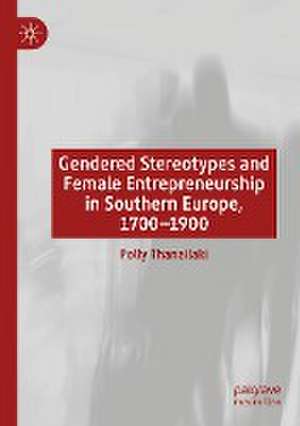Gendered Stereotypes and Female Entrepreneurship in Southern Europe, 1700-1900
Autor Polly Thanailakien Limba Engleză Paperback – 28 apr 2022
This book addresses issues that remain under-researched by feminist historians. They pertain to female economic contribution in specific geographical areas and countries such as Greece, Italy, a number of regions of France, Greek-speaking regions in the Ottoman-ruled Macedonia, and two countries in the Balkans: Romania and Bulgaria. Additionally, it compares and contrasts female economic agency in the above regions which is a field that hitherto lacks thorough study. Polly Thanailaki explores female contribution to the finances of their family and to the economy of their country and how they interlaced in a transnational historical setting, further exploring social norms and trading practices in these regions. The methodology is based on the study of original printed sources such as archives, newspapers, and journals of the period, along with secondary sources of literature. The book addresses the nexus of gender, economy, and society covering a broad spectrum of gender studies, economic history and social history in time and in geographic space.
| Toate formatele și edițiile | Preț | Express |
|---|---|---|
| Paperback (1) | 722.75 lei 6-8 săpt. | |
| Springer International Publishing – 28 apr 2022 | 722.75 lei 6-8 săpt. | |
| Hardback (1) | 727.80 lei 6-8 săpt. | |
| Springer International Publishing – 27 apr 2021 | 727.80 lei 6-8 săpt. |
Preț: 722.75 lei
Preț vechi: 881.40 lei
-18% Nou
Puncte Express: 1084
Preț estimativ în valută:
138.31€ • 143.58$ • 115.33£
138.31€ • 143.58$ • 115.33£
Carte tipărită la comandă
Livrare economică 22 martie-05 aprilie
Preluare comenzi: 021 569.72.76
Specificații
ISBN-13: 9783030662363
ISBN-10: 3030662365
Ilustrații: XI, 236 p.
Dimensiuni: 148 x 210 mm
Greutate: 0.3 kg
Ediția:1st ed. 2021
Editura: Springer International Publishing
Colecția Palgrave Macmillan
Locul publicării:Cham, Switzerland
ISBN-10: 3030662365
Ilustrații: XI, 236 p.
Dimensiuni: 148 x 210 mm
Greutate: 0.3 kg
Ediția:1st ed. 2021
Editura: Springer International Publishing
Colecția Palgrave Macmillan
Locul publicării:Cham, Switzerland
Cuprins
1. Introduction.- 2. Familiocracy in the Greek business elite class: Endogamy and other cultural traits.- 3. Women and economic input in independent Greece (19th to early 20th centuries).- 4. Gendered Entrepreneurship and Cottage Industry of the Greek-speaking communities in the Ottoman Balkans.- 5. Women’s path to economic autonomy in Italy.- 6. Rural women’s economic contribution to agricultural work in Southern Europe.- 7. Female Entrepreneurship and Guilds in Southern Europe.- 8. Gendered prejudices and the economic setting in Romania and Bulgaria.- 9. Conclusions.
Notă biografică
Polly Thanailaki holds a Ph.D. in modern history from Democritus University of Thrace, Greece, and was a visiting scholar at Harvard University, USA. Her previous publications include Gender Inequalities in Rural European Communities During 19th and Early 20th Century (2018, Springer). Her field of research is based on modern history where she mainly focuses on female education and culture, as well as on gender equality in an international perspective.
Textul de pe ultima copertă
This book addresses issues that remain under-researched by feminist historians. They pertain to female economic contribution in specific geographical areas and countries such as Greece, Italy, a number of regions of France, Greek-speaking regions in the Ottoman-ruled Macedonia, and two countries in the Balkans: Romania and Bulgaria. Additionally, it compares and contrasts female economic agency in the above regions which is a field that hitherto lacks thorough study. Polly Thanailaki explores female contribution to the finances of their family and to the economy of their country and how they interlaced in a transnational historical setting, further exploring social norms and trading practices in these regions. The methodology is based on the study of original printed sources such as archives, newspapers, and journals of the period, along with secondary sources of literature. The book addresses the nexus of gender, economy, and society covering a broad spectrum of gender studies, economic history and social history in time and in geographic space.
Caracteristici
Explores female economic contribution in southern Europe from the eighteenth to the twentieth century Focuses on geographical areas such as Greece, Italy, a number of regions in the Balkans, and France Addresses the nexus of gender, economy, and society covering a broad spectrum of gender studies, economic history and social history in time and in geographic space
